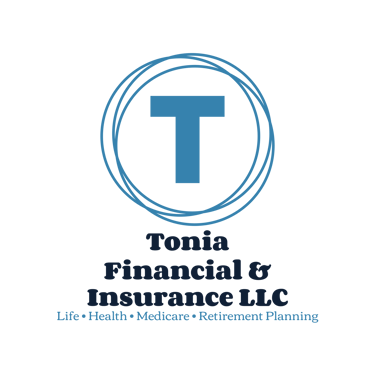Financial Freedom for Healthcare Workers
Explore the importance of retirement planning for healthcare professionals. Discover common financial pitfalls and key strategies to achieve financial independence in the demanding healthcare industry.
FINANCIAL FREEDOM/ RETIREMENT PLANNING
Tonia Perry
2/2/20254 min read


Retirement Planning for Healthcare Workers: Why You Need a Financial Freedom Plan Now
The healthcare industry is one of the most demanding and rewarding fields, but it comes with its own set of challenges—long hours, physical and emotional exhaustion, and often, a lack of financial security in retirement. While healthcare workers dedicate their lives to caring for others, many find themselves unprepared for their own financial future.
Whether you’re a nurse, physician, medical assistant, or any other healthcare professional, having a solid financial freedom plan is essential. Unlike traditional retirement, financial freedom means having the ability to choose whether or not to work, without financial stress dictating your decisions.
Let’s break down why retirement planning is crucial for healthcare workers, common financial pitfalls to avoid, and key strategies to achieve financial independence.
Why Healthcare Workers Need a Strong Retirement Plan
Burnout is Real, and You Need Options
The healthcare industry is notorious for burnout. Studies show that 62.8% of physicians and 47.4% of nurses report symptoms of burnout due to excessive workloads and stress (Shanafelt et al., 2022). While passion for the profession keeps many going, financial independence offers the option to retire early or transition to part-time work if burnout becomes overwhelming.Your Physical Health May Decline Before Retirement Age
Healthcare workers often experience chronic pain, fatigue, and injuries from long shifts and physically demanding tasks (Fragala et al., 2019). Unlike corporate jobs where employees can work until 65 or 70, many healthcare professionals struggle to work full-time into their 60s. Having a retirement fund allows you to step away when your body tells you it’s time.Pension Plans Are Disappearing
While some healthcare systems still offer pensions, many have transitioned to 401(k)-style plans that require workers to take more responsibility for their retirement savings. If you don’t actively contribute and invest wisely, you may not have enough when you retire.Student Loan Debt Delays Retirement Savings
Healthcare professionals often start their careers with massive student loan debt, sometimes delaying saving for retirement. While it’s understandable to prioritize loan repayment, failing to invest early can result in losing out on decades of compound growth.
Common Financial Pitfalls Healthcare Workers Face
Despite good salaries, many healthcare workers struggle with financial planning. Here are some common mistakes that can derail your retirement goals:
1. Not Prioritizing Retirement Early Enough
It’s easy to think, “I’ll start saving when I make more money.” But every year you delay means losing out on the power of compound interest. A 25-year-old who saves $200/month at an 8% return will have over $600,000 by 65, while a 35-year-old saving the same amount will only have around $285,000.
2. Relying Too Much on Social Security
Social Security is not enough to sustain most retirees. The average monthly benefit in 2024 is only $1,907 (SSA, 2024). Depending on Social Security alone could leave you struggling in your later years.
3. Overspending to Cope with Stress
Many healthcare workers reward themselves with expensive vacations, cars, and dining out to offset job stress. While self-care is essential, unchecked spending can drain potential retirement savings. Finding budget-friendly ways to decompress can help keep you on track financially.
4. Not Understanding Investment Options
Many healthcare professionals don’t take full advantage of 401(k)s, IRAs, or HSAs. Some don’t invest at all, leaving money sitting in low-yield savings accounts. Others invest too conservatively, missing out on higher returns over time.
Steps to Build a Financial Freedom Plan
1. Start with a Clear Vision
Before creating a financial plan, define what financial freedom means for you:
Do you want to retire early?
Do you want to work part-time in your 50s or 60s?
Do you dream of opening a private practice or switching to telemedicine?
Having a clear goal will help shape your savings strategy.
2. Max Out Retirement Accounts
Take full advantage of your employer’s 401(k) or 403(b) match—it’s free money! If your employer matches 5%, that’s a 100% return on your contributions up to that amount.
For 2024, the contribution limits are:
401(k) / 403(b): $23,000 ($30,500 if 50+)
Traditional/Roth IRA: $7,000 ($8,000 if 50+)
If your employer doesn’t offer a retirement plan, open an IRA and contribute consistently.
3. Pay Off High-Interest Debt, but Keep Investing
While paying off debt is crucial, don’t pause retirement contributions completely. A good strategy:
Pay the minimum on low-interest student loans.
Focus aggressively on high-interest debt (credit cards, personal loans).
Invest at least 10-15% of your income in retirement accounts.
4. Diversify Income Streams
Many healthcare workers increase wealth through side hustles or investments:
Real estate: Rental properties or house hacking can provide passive income.
Side gigs: Telemedicine, consulting, or teaching online can add extra cash.
Stocks and index funds: Investing beyond your 401(k) can accelerate growth.
5. Protect Your Income with Insurance
Since healthcare workers rely heavily on their ability to work, disability insurance is essential. A career-ending injury or illness can devastate your finances. Make sure you have adequate coverage.
6. Plan for Healthcare Costs in Retirement
Medical expenses rise significantly in retirement. A Health Savings Account (HSA) is one of the best ways to prepare—it offers tax-free contributions, growth, and withdrawals for medical expenses.
7. Work with a Financial Planner Who Understands Healthcare
Not all financial advisors understand the unique challenges healthcare workers face. Find a fee-only advisor familiar with medical professionals to guide you on investing, taxes, and retirement planning.
Conclusion
Retirement planning isn’t just about quitting work someday—it’s about gaining the freedom to choose how you spend your time. For healthcare workers, financial independence means:
✅ Being able to step away from burnout when needed.
✅ Retiring on your terms, without financial stress.
✅ Having security even if your physical health declines.
Start taking small steps today toward financial freedom. Your future self will thank you!
Citations
Fragala, M. S., et al. (2019). "Healthcare worker injury and musculoskeletal disorders: Risks and solutions." Journal of Occupational Health & Safety.
Shanafelt, T. D., et al. (2022). "Burnout and career satisfaction among healthcare professionals: A national survey." JAMA Network Open.
Social Security Administration (SSA). (2024). "Monthly statistical snapshot." www.ssa.gov

EMAIL: Strive.tonia@gmail.com
PHONE:(216)800-7303
© 2025. All rights reserved.
We do not offer every plan available in your area. Currently, we represent 9 organizations which offer 80 products in your area. Please contact Medicare.gov, 1-800-MEDICARE, or your local State Health Insurance Assistance Program (SHIP) to get information on all of your options. This is a proprietary website and is not associated, endorsed or authorized by the Social Security Administration, the Department of Health and Human Services or the Center for Medicare and Medicaid Services. This site contains decision-support content and information about Medicare, services related to Medicare and services for people with Medicare. If you would like to find more information about the Medicare program please visit the Official U.S. Government Site for People with Medicare located at http://www.medicare.gov
Independent Insurance Agent | Final Expense Insurance Ohio | Medicare Advantage Plans Cleveland | Life Insurance for Children | Medigap Plans PA | Insurance Advisor for Seniors | Community Insurance Help
